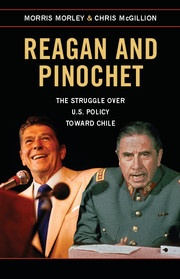5 - Abandoning Pinochet
Published online by Cambridge University Press: 05 February 2015
Summary
Entering 1987, the Reagan administration faced a major challenge to restore a degree of coherence and credibility to its foreign policy-making processes in the wake of the Iran-Contra scandal involving illegal arms transfers to the Nicaraguan rebels. White House intervention in Nicaragua and elsewhere in Central America did not touch directly on Chile policy, but it did change the cast of characters previously involved in the debate and eventually altered the balance of influence between the various foreign policy agencies, damaging the reputation of the NSC and the CIA and restoring a leading role to George Shultz and the State Department in the overall conduct of foreign policy.
Although not at the top of the Reagan foreign policy agenda, Chile would rise to prominence at regular intervals – surrounding deliberations of the UNHRC and annual UNGA meetings, when the Pinochet regime’s human rights record came under scrutiny and when Chilean loan requests came before the MDBs. As well, Chile was fast becoming a standout concern in Latin America as other military regimes passed power back to democratically elected governments, and it was regarded by many within the administration as the sole major example the White House could cite to demonstrate that its professed commitment to democracy included targeting right-wing dictatorships in the region.
In contrast to the difficulties Reagan and his senior foreign policy officials now confronted domestically, Pinochet was in as srong a position as ever.
- Type
- Chapter
- Information
- Reagan and PinochetThe Struggle over US Policy toward Chile, pp. 199 - 238Publisher: Cambridge University PressPrint publication year: 2015

